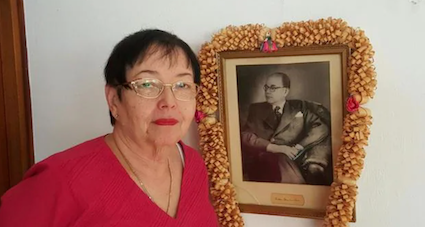(Anita Bose Pfaff is the daughter of Subhas Chandra Bose and she opened up to India Today over the persistent questions on her father’s relationship with Mahatma Gandhi. The transcript of the conversation is done by Bhumika Arora).
Q: Jawaharlal Nehru and Gandhiji were ready to hand over Netaji to the British What do you make of this comment by Kangana Ranaut?
A: I don’t know of any such event, but I think it is rather mute now to discuss the question of whether one or the other Freedom Fighter did more for independence. I think they’re all the Freedom Fighters and the millions of people who participated in the struggle for Independence who were quite unknown, generally speaking, contributed to India’s independence. It is not one has done, having been the only father of Independence.
And we are certainly in a situation to say today that the relationship between Mahatma Gandhi and my father was an over difficult in nature in so far that on one hand Gandhi obviously felt that he couldn’t control my father, on the other hand, we also have to realize that my father was a great admirer of Mahatma Gandhi and throughout his struggle for independence of his paid attention to whether he reacted to anything that he, being my father, did and what his reaction was. For example, he always wanted to know whether there is any reaction to his speeches from Germany.
This whole argument about them being enemies is a very one-sided way of looking at it. So to say fighting for the same goal and on the other hand, they did not agree entirely on how to do that and particularly Mahatma Gandhi and my father were of a different opinion.
Q: You pointed out how they did have differences. But what do you make of this entire argument of this debate that, you know, it was Gandhi and Nehru? Vs Netaji and the likes of Bhagat Singh. What do you have to say really about this?
A: Both of them were great heroes and fought for Indian independence and you might argue one could have done without the other. I doubt it. Ultimately, I think it was a combination of factors that led to India’s independence. It certainly was not like some of the Congress members wanted to claim for a long time, that it was only non-violent action that was responsible for gaining independence. I think we know very well from sources that became available years after Independence that the actions of Netaji and INA contributed in a very important way. But on the other hand, it’s equally nonsensical to say was only Netaji and the INA who brought about independence. I mean, Gandhi was the most inspiring, an important leader to many Indians, including Netaji.
Q: When Kangana said that our Freedom in 1947 was a ‘bheek’ what do you make of that?
A: I think there’s no point in taking a very naive, one-sided view of historical developments. It was a whole set of contributing factors that brought about independence and the struggle for Independence was certainly one. The ending of World War II, and the losses that Britain also suffered during the Second World war; and there was another defeat of the conservative government by the Labor government. So I think there’s no point in the sort of taking it very naive attitude towards that I think one really ought to look at it in a more complex setting.
Q: Do you also believe there are some aspects of the freedom struggle that perhaps we need more clarity on that? Do we need more details or like the transfer of power in 1947?
Q: I think it’s very rare that one has started everything extensively and there is no more additional insight to be gained, but I think on the other hand. I think most of the documents regarding that time have been published and have been declassified and we know quite a bit about what happened. I mean, we don’t know what all people thought. I mean the actors of those days thought because not everyone sort of made a full statement explaining all his or her motivations in the matter.


